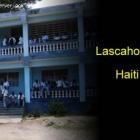ADVERTISEMENT
Education
The education system in Haiti faces shortages in educational supplies and qualified teachers, and the rural population remains underrepresented in the country%u2019s classrooms.There are many challenges. Currently, most Haitian schools are private rather than state-funded
Opening of the first training session for 40 directors of high school in Haiti
High School Directors get New Training and Computers. Minister of Education, Nesmy Manigat, officiated at the beginning of the new program to train 40 high school Directors in modern techniques of high school administration in West Department in Jacmel. Eventually the program will train 203 high school principals across Haiti.
The government has set reforming secondary education high on its agenda and issued a decree to this effect, the training program being an integral part of its master plan. To raise the performance level of students so they will perform better on their year-end exams is the goal.
Over 60% of schools in Haiti have no drinking water or toilet
"Water is life", and "education is the key to the future", right? There is also cleanliness and its import to Christianity. When all three of these edicts are being railroaded in the Haitian school system, the prospects look dire for the nation's children trying to forge an education without drinking water or even the use of toilets in over 60% of the schools in the country.
About a month before the start of the Haitian school year, 2014, representatives of the Human Rights Watch visited schools along the Haitian Central Plateau, to evaluate the sanitation conditions and access to water at the various facilities. The results showed none of the visited schools were in compliance with the guidelines set out by the government for proper school hygiene. The Human Rights Watch calculated that nearly 60% of the schools have no access to toilets and that 3/4ths are without drinking water.
kreyol ayisyen or Haitian Creole, a fusion of other languages
The term "Creole" comes from a Portugese word meaning "raised in the home". The language resulted and developed probably after 1680 and before 1730 from the efforts of African slaves who wanted to speak the French they heard when they arrived in the European plantations in the colony of Saint-Domingue (now Haiti). African slaves came from many different parts of West Africa and they used to speak many different languages. On any one plantation, several African languages were spoken. They were seldom able to communicate among themselves in a common African tongue. The slaves, on their arrivals in Haiti, first came into the contacts with the French settlers, speaking several dialectal forms of French as they also came from different parts of France. Thus, as a common mean to communicate, the slaves tried to learn Popular French .
The UPS Foundation to help fund YMCA d'Haiti Literacy Program
On January 30, 2015, the UPS Foundation held a function that served as a handing over ceremony of a check the corporation has donated to fund a literacy program in Haiti. The UPS division, which has been a leader in programs of global citizenship, has given $30,000 USD to the cause, handing the donation over to the YMCA d'Haiti Literacy Program, which is an organization with the mission of teaching the skills of literacy and reading to the youth, seniors and women who are underprivileged in Haiti.
At the ceremony, the corporate executives of the UPS were present including the UPS Caribbean country manager, Pedro Capote, the UPS Americas Region vice president of Human Resources and Labor Relations, Charnley Conway, as well as members of staff of the YMCA d'Haiti including Board Chair, Roges Lamothe, and the General Secretary, Gwénaël Apollon. The grant will service two of the community centers of the YMCA in Port-au-Prince and Laboule. The current programs offered will benefit through an advancement in their capacity to reach more of the old, young and women who gain knowledge through the activities and initiatives given.
New salary scale for teachers in the public sector in Haiti
A new salary scale for the nation's teachers was published recently by the Ministry of National Education and Vocational Training (MENFP) with the help of the Office of Management and Human Resources. The scale was developed with consideration to three criteria developed for the purpose with technical aid from the Management Board and Human Resources. It is part of a bigger plan to overhaul the education system, in which teachers will also benefit from better working conditions and an overall fortification of teaching practices and the education system as a whole.
Education represents major challenge for Haiti, but also the solutions to poverty
Principal of Santo's SOS School, Charles Myrtil, has expressed his belief that the state should provide education and build schools for the nation's children as a rule, regardless of which administration is in power. As the head of a school that has been instrumental in providing education, food and other necessities to children and their families in the poor regions (especially with the work they did following the 2010 earthquake), he is one who understands that one of the country's greatest problems, education, can also be its most viable solution out of poverty.
Almost half of the country of Haiti (approximately 5 million people) are under 18 years of age. The numbers of those living in poverty in the country are well known, so when 80% of schools are private, millions are left behind without the key ingredient to make their lives better. A cycle exists where poorer children are forever unable to bridge the educational, and therefore, social gap between them and those who can pay for educations. As such, illiteracy is rampant, and potentially brilliant minds, who could lift the country out of its mire, never have the chance to realize their abilities. Schools have been build to facilitate poorer students across the island, and programs, such as those offering meals, play a hand in helping to fix this problem. However, there are still children who, to receive their education on a daily basis, need to walk to school every day distances of 15 and even 20 kms.
New graduating students of the Ecole Normale Superieure
The École Normale Supérieure (ENS) graduated 134 students in July 2014. At the graduation ceremony Minister of National Education and Vocational Training (MENFP), Nesmy Manigat, handed out appointment letters officially recognizing that the students of École Normale Supérieure (ENS) successfully finished a six-month internship in classroom teaching. Appearing at the ceremony held at the MENFP head office were ENS officers: General Director Denis Cadeau; Dean Louis Alvarez; Secondary Education Director Job Maurice; Human Resource Director Jacques Francois; and Pole Education and Quality Jackson Pleteau.
Minister Manigat made reference during his speech to a Memorandum of Understanding MENFP has recently signed with ENS that will incorporate ENS graduates into the public education sector as certified to teach, something that Haiti needs more of in its education system. It will be a game changer he emphasized. Manigat's purpose he says is to invigorate MENFP/ENS's partnership so the education sector may be overhauled.
New salary scale for Haitian teachers proposed
In an effort to improve teacher's working conditions in the public sector of education and to strengthen the education system, the Ministry of National Education and Vocational Training (MENFP) has developed new salary scale.
Based on qualification, the educational staff is grouped into three cactegries:
Salary scale:
Teachers with an educational level of the 3rd cycle of basic education will receive from 13,000 to 14.333 Gourdes.
Teachers graduated from "École Normale d'instituteur will have a starting salary of 20,000 gourdes and can go all the way to 29.282 gourdes.
Teachers with a bac +3 + (CAPED), the salary will be between 21,038 and 40,132 Gdes Gdes
Fundamental School Enrollment Reaches 90% in Haiti
President Martelly and National Education and Vocational Training Minister Manigat joined with the teachers' union at the National School of Petion-Ville to support "A quality education for a better world" initiative on the occasion of "Unite for Education" campaign global initiative.
Martelly, speaking in front of Petion-Ville's Mayor Brutus, the Petion-Ville principle, and student body, repeated his government's vow to keep improving Haiti's education system. He considers it of paramount importance to his presidential legacy. He moreover encouraged all investment partners to cooperate so every child has access to a quality education. Addressing students, he recommended they study so they might pass their finals with high marks and ensure their acceptance to universities.
Quality Education for Haiti to be Modeled on Finnish System
One of the most crucial elements to building and sustaining a healthy economy in Haiti is a developed education system. Recently the governments of Haiti and Finland have partnered up to address solutions to the problem of adequately educating the Haitian populace.
Minister of Education, Nesmy Manigat, and his equivalent Krista Kiuru of Finland signed a cooperation agreement that includes, among other considerations, teacher training and curriculum reform. The signing occurred at an international conference on the quality of education in the presence of Deputy Director Ecclesiaste Telemaque and Quisqueya University Rector Jacky Lumarque, as well as other Finnish educators and senior ministerial officials from both countries.
Our objective is to share with you news and information about Haiti and the people of Haiti. Traditions, habits and the way we were or grew are alive in this site. We highly recommend that you Subscribe to our Newsletter and also share with us some of the things that are memorable and made us unique people.

 Marmelade, Haiti
Marmelade, Haiti  Maissade, Haiti
Maissade, Haiti  Verrettes, Haiti
Verrettes, Haiti  Lascahobas, Haiti
Lascahobas, Haiti  Black Friday Shopping Season
Black Friday Shopping Season